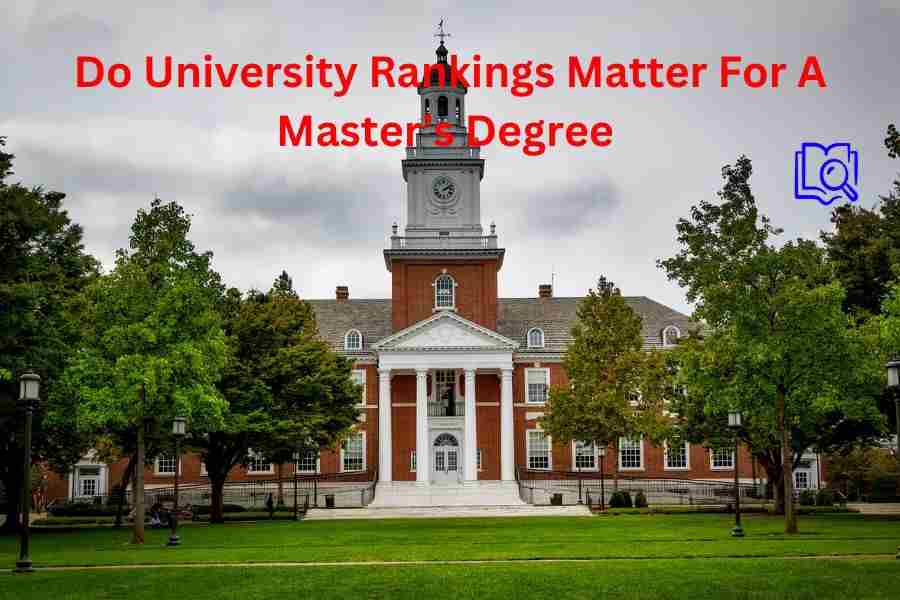Last updated on November 27th, 2025 at 12:27 pm
University rankings are a common consideration for students choosing where to get a master’s degree, but the answer to ‘Do university rankings matter for a master’s degree?’ can be complex.
Rankings provide insight into the perceived prestige of an institution, its faculty, resources, and research output.
However, the significance of these rankings depends on a variety of factors that relate to individual goals, the specific field of study, and career aspirations and can justify the worth of getting a master’s degree.
Table of Contents
1. Understanding University Rankings
University rankings, such as those by QS World University Rankings, Times Higher Education, and U.S. News, are built on criteria including academic reputation, employer reputation, research impact, student-to-faculty ratio, and international diversity.
These rankings can be indicative of the institution’s overall academic standing, but they don’t always reflect the quality of specific master’s programs.
| Ranking Sysrem | Key Factors Considered |
|---|---|
| QS World University Rankings | Academic reputation, employer reputation, faculty/student ratio. |
| Times Higher Education | Research, teaching, international outlook, citations. |
| U.S. News & World Report | Global research reputation, publications, conferences |
2. When University Rankings Matter
There are certain circumstances when university rankings can play an important role:
- Global Reputation: In fields like engineering and technology, getting a master’s from MIT can provide a competitive edge due to its reputation as being the top-ranked in these disciplines.
- Networking Opportunities: Prestigious institutions often attract top-tier faculty, employers, and other students, making it easier to build valuable connections that could shape your career path.
- Access to Resources: Highly ranked universities may have better research facilities, more funding, and access to the latest technologies, providing a richer learning experience.
- 3. When University Rankings Might Not Matter as Much
- Program-Specific Reputation: A university might not rank highly overall, but it could have a standout department in the field you wish to study.
While rankings provide a general picture, they don’t tell the whole story. For many students, particularly those seeking highly specialized fields or professional degrees, the following factors might matter more:
For example, a school may not be a top university overall, but it could excel in engineering, business analytics, or public health.
- Geographical Influence: Employers in different regions may have a preference for local universities over top-tier international ones, especially if they have strong ties to industries in the area.
A master’s degree from a local university might be just as valuable within a specific job market.
- Cost and Financial Aid: Some students prioritize affordability over rankings. Lower-ranked universities may offer significant financial aid or scholarships, making a master’s degree more accessible without the burden of high student loans.
4. Ranking and Field-Specific Considerations
In some fields, such as the humanities or education, university rankings might matter less.
In contrast, in research-heavy disciplines like science and engineering, the resources and research output of a university can be more critical.
This can make higher-ranked universities more appealing due to their advanced labs, larger funding pools, and extensive research networks.
5. Ranking and Career Prospects
Many employers look beyond just the name of the university when hiring. They evaluate:
- Skills and Experience: Relevant experience, internships, projects, and publications often outweigh the prestige of the university in the job application process.
- Alumni Networks: Some lower-ranked schools have stronger alumni networks in certain industries, offering graduates better job placement opportunities compared to higher-ranked universities that don’t specialize in those fields.
6. Alternative Factors to Consider
Aside from rankings, consider other factors when choosing a university for a master’s degree:
- Faculty expertise: The opportunity to learn from leading experts in your field is invaluable. Research faculty backgrounds, published work, and areas of expertise.
- Curriculum Relevance: A well-designed program that aligns with your career goals and equips you with industry-relevant skills should be prioritized over a university’s overall rank.
- Location and Industry Ties: Universities with strong links to industries you want to work in can provide practical experience, internships, and employment opportunities postgraduate.
FAQs
Do university rankings impact job prospects after a master’s degree?
Yes, in some industries, particularly those that value academic prestige, a highly-ranked university can give you an advantage. However, experience, internships, and specific skills often play a larger role.
Should I choose a top-ranked university if it’s not affordable
If financial constraints are a concern, opting for a lower-ranked but still reputable university with good scholarships or financial aid options may be a better choice. Education quality isn’t always reflected in ranking alone.
Are university rankings reliable?
University rankings can provide helpful insights, but they aren’t the full picture. Factors like teaching quality, faculty expertise, and program fit are equally important when making a decision.
Conclusion: Do University Rankings Matter for a Master’s
The importance of university rankings for a master’s degree varies depending on the individual student’s career aspirations, academic goals, and specific field of study.
While rankings can be a useful guide for identifying prestigious institutions with strong resources, they should not be the only deciding factor.
A thorough evaluation of the program’s curriculum, faculty, job placement rates, and networking opportunities is essential to making the right decision for your master’s journey. In many cases, program-specific strengths or geographic influence may outweigh the significance of the university’s rank.
By carefully assessing both the ranked and unranked qualities of a program, students can make a well-informed decision that aligns with their personal and professional objectives.




